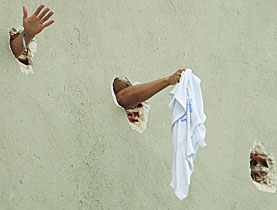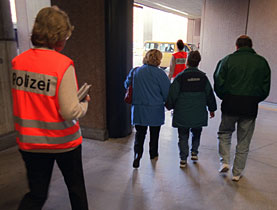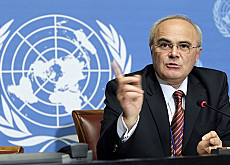Rights’ records come under UN gaze

The Geneva-based United Nations Human Rights Council has started its first-ever Universal Periodic Review (UPR), scrutinizing the human rights records of all UN members.
Observers are warning the council’s credibility depends on the success of the new mechanism. Switzerland is due to go before the review on May 8.
Over the next two weeks, the first 16 countries will have their human rights records examined by a UPR working group, including Bahrain, Britain, India, Brazil, Algeria, South Africa, and Argentina.
This is the first time the records of all 192 UN member states, regardless of their size, wealth, military or political importance, will be examined using a common mechanism.
The review, which began on Monday, is seen as a major move away from the selectivity that so often afflicted the council’s predecessor, the much-maligned and highly politicised Human Rights Commission.
However, diplomats and human rights specialists recognise that the success of the new mechanism has yet to be proven.
“It was a good start. There seemed to be frank dialogue,” Peter Splinter from Amnesty International told swissinfo after the inaugural review of Bahrein.
“If the UPR is about serious human rights discussions and leads to improvements in countries reviewed it will have a significant contribution,” he added.
Several Bahraini NGOs and the International Federation for Human Rights (FIDH) expressed their disappointment.
“Various countries simply congratulated the Bahrain delegation,” said FIDH Director Antoine Madelin, adding that many countries outside the Middle East didn’t even participate.
“It was a monologue rather than a dialogue,” said human rights activist Abbas Omran.
Process
Under the new review, each state presents its human rights record and takes part in an “interactive dialogue” with a UPR working group, comprising the 47 council members and observers.
Switzerland will be one of the three rapporteurs for Brazil’s human rights review. Uruguay, Pakistan and South Africa will be supervising the Swiss presentation.
The first and second UPR sessions will also have to be adopted by the council at its next regular session in June.
“Only then will we be able to give a more substantive analysis on the whole process, before it’s too early,” international organisation consultant Yves Lador told swissinfo.
The council will then decide if and when any specific follow-up is necessary and, after exhausting all efforts, will address “cases of persistent non-cooperation”.
Still in its infancy, the process faces a number of teething problems.
“It’s being made up as the council goes along,” said Splinter. “It’s far from clear exactly what the process is going to be or its effectiveness. There could be some nasty surprises in the future.”
On Friday the Human Rights Council president, Doru Costea, got one such shock when he was presented with a letter signed by African and Arab countries and those belonging to the Organisation of the Islamic Conference asking that each stage of the procedure be fixed in advance and that the sessions – although public – not filmed.
An emergency meeting was held over the weekend to try to resolve the matter.
Swiss rights
In February a coalition of 30 Swiss NGOs published a report outlining concerns about human rights practices in Switzerland ahead of the examination of the official Swiss report. The coalition also held talks with the Swiss foreign ministry.
Sandra Imhof, coordinator for the NGO coalition, told swissinfo they were generally satisfied with the official document submitted to the UN.
“Dialogue was constructive and now we have to see whether the coalition’s main demands are implemented,” she said.
The NGOs are urging the authorities to establish a national human rights institution that would accompany the Swiss federal and cantonal authorities in the implementation of human rights conventions.
They are also demanding action plans for the human rights conventions Switzerland has ratified, in particular concerning the rights of the child.
Another concern is the treatment of immigrant children in Switzerland, who are dealt with according to “non-child-friendly” asylum procedures.
“Switzerland has contributed a great deal to the review process; for the country’s image it’s in its interest to show it can implement the recommendations that have been made,” said Imhof.
swissinfo, Simon Bradley in Geneva
Swiss Foreign Minister Micheline Calmy-Rey presented the concept of the Human Rights Council in March 2004 to replace the widely discredited and highly politicised UN Human Rights Commission created in 1946. The UN officially accepted the idea in September 2005.
The first session of the UN Human Rights Council took place in June 2006 at its headquarters in Geneva. The Council reports directly to the UN General Assembly.
It consists of 47 member states, which are selected with absolute majority by the UN General Assembly. It meets at least three times a year and can also hold special meetings to discuss crisis situations.
The 27 seats of African and Asian countries heavily outvote western countries, which hold seven seats on the council.
The first session of the Human Rights Council’s Universal Periodic Review Working Group takes place in Geneva from April 7-18, during which 16 states will have their human rights records examined under this new mechanism.
The first group of states to be reviewed are: Bahrain, Ecuador, Tunisia, Morocco, Indonesia, Finland, Britain, India, Brazil, the Philippines, Algeria, Poland, the Netherlands, South Africa, the Czech Republic and Argentina.
The review will be facilitated by groups of three States members of the Council, or troikas, which will act as rapporteurs.
The reviews are based on three documents: information provided by the state concerned; a report compiled by the Office of the High Commissioner for Human Rights (OHCHR); and information provided by other organisations, such as NGOs, national human rights bodies, academic and research institutions and civil society figures.

In compliance with the JTI standards
More: SWI swissinfo.ch certified by the Journalism Trust Initiative




You can find an overview of ongoing debates with our journalists here. Please join us!
If you want to start a conversation about a topic raised in this article or want to report factual errors, email us at english@swissinfo.ch.